Completed evaluations
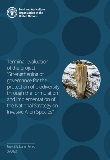
Terminal evaluation of the project "Strengthening of governance for the protection of biodiversity through the formulation and implementation of the National Strategy on Invasive Alien Species"
29/12/2023
The project’s aim was to develop a strengthened governance framework to enable the effective protection of biodiversity against the impacts of Invasive Alien Species, as well as to enhance current and future socio-economic benefits derived from the conservation and sustainable use of biodiversity. (Spanish only)
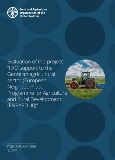
Evaluation of the project “FAO support to the Georgian agricultural sector (European Neighbourhood Programme for Agriculture and Rural Development [ENPARD III])”
29/12/2023
The evaluation covered three main areas of concern: i) capacity development of the Ministry of Environmental Protection and Agriculture (MEPA); ii) grant support to farmers/agricultural companies; and iii) technical support to famers. A systematic and objective assessment was made of the project design, the project’s implementation and its results in order to determine the project’s relevance and achievement of objectives, but also its efficiency, effectiveness, impact, and sustainability.
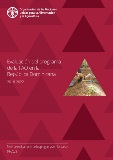
Evaluation of FAO’s country programme in the Dominican Republic 2018–2022
28/12/2023
FAO has had an impact on public policies on food security and has strengthened capacities to promote associations, as well as the adoption of innovative practices in areas such as climate-smart livestock farming. On the other hand, a potential has been identified to strengthen collaboration between partners that share objectives with the Organization. (In Spanish)

Evaluation of the project "Agriculture for Economic Growth and Food Security/Nutrition to mitigate migration flows"
28/12/2023
The project was pivotal in supporting the first-ever key policies which were a necessity in the agriculture sector and laid the foundation for the development of strong policies and strategic plans that enhanced institutional capacities. FAO reinforced national capacities by supporting institutions at all levels to prepare, implement, monitor and evaluate evidence-based policies and programmes.
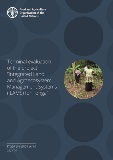
Terminal evaluation of the project "Integrated Land and Agroecosystem Management Systems (ILAMS) for Tonga"
18/12/2023
The final beneficiaries interviewed by the evaluation have been well engaged in the communal nurseries and medicinal plants preservation activities, which were considered useful for preservation of forest, biodiversity and enhancement of quality of soil. The enclosed piggeries model introduced by the project was overall accepted, but some of its elements (such as feeding and breeding), as well as its cultural appropriateness, deserve further attention.
-an-invasive-alien-species-in-the-chilean-patagonia.tmb-th600x450.png?Culture=en&sfvrsn=e78f3f76_1)
Terminal evaluation of the project “Strengthening and development of instruments for the management, prevention and control of beaver (Castor canadensis), an invasive alien species in the Chilean Patagonia”
08/12/2023
The project, funded by GEF, aimed to improve the institutional frameworks for the control, prevention and management of the invasive exotic species in high value ecosystems for biodiversity in the Magellan region and Chilean Antarctica. In addition, the project tried to address the conservation of biodiversity in the management of productive landscapes.
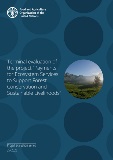
Terminal evaluation of the project “Payments for Ecosystem Services to Support Forest Conservation and Sustainable Livelihoods”
27/11/2023
Key recommendations involve: flagging the most promising communities for national authorities as potential grant applicants under the REDD+ programmes; preparing an exit plan for the four districts that benefit from the project to ensure minimum technical follow-up in the supported communities; and systematizing the approach, experience and good results achieved with the practices of the beekeeping and savings and credit groups to reinforce the project’s learning dimension.
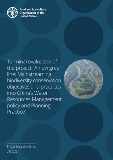
Terminal evaluation of the project “A new green line: Mainstreaming biodiversity conservation objectives and practices into China’s Water Resources Management Policy and Planning Practice”
20/11/2023
The evaluation recommended replicating activities and practices in pilot provinces; finalizing the sustainability plan; ensuring that reporting and evidence clearly address targets and are prepared in a timely manner; adopting a systematic and transparent approach to the regular reassessment of environmental and social impacts; and establishing a bird monitoring system along the Chuan River.
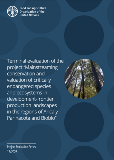
Terminal evaluation of the project “Mainstreaming conservation and valuation of critically endangered species and ecosystems in development-frontier production landscapes in the regions of Arica y Parinacota and Biobío”
16/11/2023
The project was highly relevant to the Government of Chile by as it is aligned with national priorities in environmental matters. In addition to promoting the development of public policy instruments aimed at knowledge and protection of the Arica hummingbird, the Darwin fox, the huemul and the queule, the project carried out a important effort in training and raising awareness about the importance of biodiversity among officials, farmers and schoolchildren.
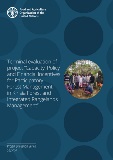
Terminal evaluation of project “Capacity, Policy and Financial Incentives for Participatory Forest Management in Kirisia Forest and Integrated Rangelands Management”
14/11/2023
The participatory forest management project was implemented through a partnership between FAO, the Kenya Forest Service, the Kenyan Wildlife Service, Samburu County Government, Kenya Forestry Research Institute, Community Forest Associations and the Suyian Trust. The evaluation assesses the extent to which the project’s global environmental objective and development objective were realized.
